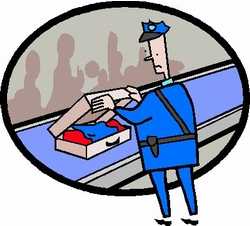Increased Cargo Screening, Unionized Screeners Among
Proposals
 There are some new
sheriffs in the town of Washington, DC... and they've got some
radical ideas on improving airport security. House Democrats -- in
control of Congress for the first time since 1994 -- are pushing
new anti-terrorism legislation that, if enacted, would change
several aspects of airport security.
There are some new
sheriffs in the town of Washington, DC... and they've got some
radical ideas on improving airport security. House Democrats -- in
control of Congress for the first time since 1994 -- are pushing
new anti-terrorism legislation that, if enacted, would change
several aspects of airport security.
Most notably, the proposed laws -- which build upon the general
recommendations established by the 9/11 Commission -- would
drastically tighten regulations governing the screening of cargo at
airports. The New York Times reports the laws include initiatives
intended to keep nuclear technology off the black market.
"Today marks a giant leap forward toward a safer and more secure
America," said Representative Bennie Thompson (D-MS), the new
chairman of the House Committee on Homeland Security, as he
unveiled the bill Friday.
The proposed legislation requires that within three years, all
cargo on passenger jets be inspected for explosives... in a similar
manner to how checked luggage is screened now.
Some Senate Democrats, however -- in an uneasy truce with the
Bush administration, and the Department of Homeland Security -- say
the House bill goes too far, and would be far too expensive and
complicated to implement.
"Airplane passengers must be assured that any cargo on a
passenger jet will not pose a terrorist threat," said independent
Connecticut Senator Joe Lieberman, who now leads the Homeland
Security and Government Affairs Committee. "But we must achieve
these goals in an efficient manner to allow for the free flow of
commerce without placing undue economic burdens on importers or
bringing air traffic to a standstill."
More thorough screening of air cargo alone is estimated to cost
$3.6 billion over the next decade, said Homeland Security spokesman
Russ Knocke. Currently, about 30 percent of all air cargo is
inspected by dogs or X-ray machines.
The Democrats' bill -- which was expected to come to a vote as
soon as Tuesday -- would also require all cargo passing through
America's ports to be screened in a similar manner within five
years -- a measure Knocke says could cause ports "to literally shut
down."
Unionized Screeners
 The House bill also includes a
provision that would allow about 43,000 screeners with the
Transportation Security Administration to unionize, something the
Bush administration banned when Congress created the agency in
2001.
The House bill also includes a
provision that would allow about 43,000 screeners with the
Transportation Security Administration to unionize, something the
Bush administration banned when Congress created the agency in
2001.
The Washington Post reports the measure is based on a bill
sponsored by Representative Nita Lowey (D-NY) last year, which
failed to move out of committee by a single vote.
The new provision -- put forth by Thompson -- would required
Homeland Security to apply current standards governing other
federal employees' rights to join unions to the TSA. Employees of
the agency, including screeners, could then decide on their own
whether to join a union. Certain whistleblower rights would also
protect them.
The American Federation of Government Employees (AFGE) maintains
collective bargaining rights help smooth operations, through
providing a structure to address job performance and other
issues.
AFGE organizer Peter Winch says the union asked Democrats to put
screener bargaining rights "on the agenda for the first 100 hours
... It does not make sense to keep these employees from collective
bargaining rights when other Department of Homeland Security
employees have those rights."
A Homeland Security spokesman declined to comment Monday on the
proposal.
 ANN's Daily Aero-Term (12.01.25): Convective SIGMET
ANN's Daily Aero-Term (12.01.25): Convective SIGMET ANN's Daily Aero-Linx (12.01.25)
ANN's Daily Aero-Linx (12.01.25) NTSB Final Report: Remos Aircraft GmbH Remos GX
NTSB Final Report: Remos Aircraft GmbH Remos GX Aero-News: Quote of the Day (12.02.25)
Aero-News: Quote of the Day (12.02.25) ANN's Daily Aero-Term (12.02.25): Coupled Approach
ANN's Daily Aero-Term (12.02.25): Coupled Approach




